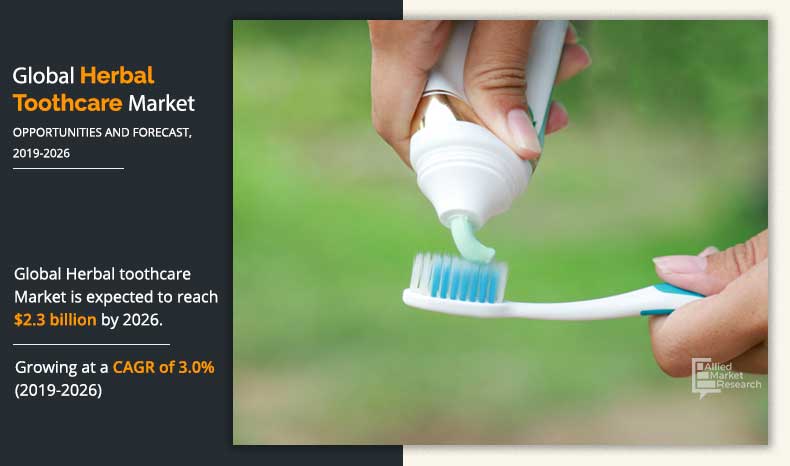
According to a new report published by Allied Market Research, titled, “Herbal Toothcare Market by Type and Sales Channel: Global Opportunity Analysis and Industry Forecast, 2019–2026,” the global herbal toothcare market size was $1.6 billion in 2018, and is projected to reach $2.3 billion by 2026, registering a CAGR of 3.0% from 2019 to 2026.
Mechanical plaque removal has been a widely accepted method for controlling gingivitis and plaque. To control plaque as well as prevent and reduce oral disease, various chemical formulations are being used. Chemicals such as chlorhexidine gluconate, fluoride, and triclosan, are widely accepted in toothpastes to prevent gingivitis and plaque. However, chemical formulations at times lead to undesirable side effects such as tooth discoloration, altered taste, and tooth staining. Furthermore, fluoride is considered toxic when ingested in high levels. Consumers today have become more health conscious and to avoid the health problems caused by chemicals, a transition toward natural products has been seen in the last few years. As a result, herbal ingredients for toothcare have gained increased attention from the engaged stakeholders in the herbal toothcare industry.
Ask for sample copy of this report >> > https://www.alliedmarketresearch.com/request-sample/6402
Herbal ingredients in toothcare products such as toothpastes and mouthwashes, have several benefits. Herbal ingredients such as echinacea have immune stimulatory property, chamomile has anti-inflammatory effect, myrrh is a natural antiseptic, rhatany and sage have anti-hemorrhagic properties, peppermint oil has antiseptic, analgesic & anti-inflammatory properties. Peelu is a natural tooth whitening fiber whereas guava extract relieves tooth pain. In addition, neem is widely used owing to its anti-bacterial properties, along with ginger, which imparts antiseptic properties. The natural ingredients encompass all the necessary properties required for maintaining oral hygiene and preventing dental caries.
Often an allergic reaction is caused among consumers owing to the presence of synthetic flavoring agents or preservative ingredients. Common allergens include foaming agents, such as sodium lauryl sulfate, parabens, and fluoride. Presence of such allergens is expected to cause increased sensitivity of gums and teeth, rise in redness or swelling of tongue and lining of mouth, inflamed skin or chapped lips, body rash or hives, anaphylactic shock, or Angioedema. Herbal toothpaste may exert significant therapeutic effects on gingivitis and plaque when compared to conventional paste.
Get detailed COVID-19 impact analysis on the Herbal Toothcare Market Request Now ! https://www.alliedmarketresearch.com/request-for-customization/6402?reqfor=covid
The global herbal toothcare market is segmented into type, sales channel, and region. By type, the market is studied across toothpaste, toothpowder, and mouth wash. By sales channel, it is classified into hypermarket/supermarket, independent stores, specialty stores, and online sales channels. Region wise, the herbal toothcare market is studied across North America, Europe, Asia-Pacific, and LAMEA.
Key Findings of the Study:
The toothpaste segment was the highest contributor to the global herbal toothcare market, with $1.4 billion in 2018, and is estimated to reach $2.0 billion by 2026, at a CAGR of 4.4% during the forecast period.
In 2018, by sales channel, the hypermarket/supermarket segment accounted for about half of the global market share in 2018, and is expected to grow at the CAGR of 4.4%.
By region, Asia-Pacific led in terms of herbal toothcare market share in 2018 and is expected to retain its dominance during the forecast period.
LAMEA is anticipated to grow with robust CAGR of 6.8% during the herbal toothcare market forecast period.
BUY NOW :- https://www.alliedmarketresearch.com/checkout-final/c4630130f7424b9edde899270c0581e7
Some of the key players in the herbal toothcare market analysis includes Procter & Gamble, Johnson & Johnson Services, Inc., Colgate-Palmolive Company, Unilever Group, GlaxoSmithKline PLC (GSK), Himalaya Herbals, Dabur International Ltd., Amway Corporation, Patanjali Ayurved Ltd., and Vicco Laboratories.
Allied Market Research, a market research and advisory company of Allied Analytics LLP, provides business insights and market research reports to large as well as small- & medium-scale enterprises. The company assists its clients to strategize business policies and achieve sustainable growth in their respective market domain.
Allied Market Research provides one-stop solution right from data collection to investment advice. The analysts at Allied Market Research dig out factors that help clients understand the significance and impact of market dynamics. The company applies client’s insight on the factors such as strategies, future estimations, growth or fall forecasting, opportunity analysis, and consumer surveys among others. As follows, the company offers consistent business intelligence support to help clients transform into a prominent business firm.
David Correa
5933 NE Win Sivers Drive
#205, Portland, OR 97220
United States
USA/Canada (Toll Free):
+1-800-792-5285, +1-503-894-6022
UK: +44-845-528-1300
Hong Kong: +852-301-84916
India (Pune): +91-20-66346060
Fax: +1(855)550-5975
help@alliedmarketresearch.com
Web: www.alliedmarketresearch.com
Allied Market Research Blog: https://blog.alliedmarketresearch.com
Follow Us on | Facebook | Twitter | LinkedIn |